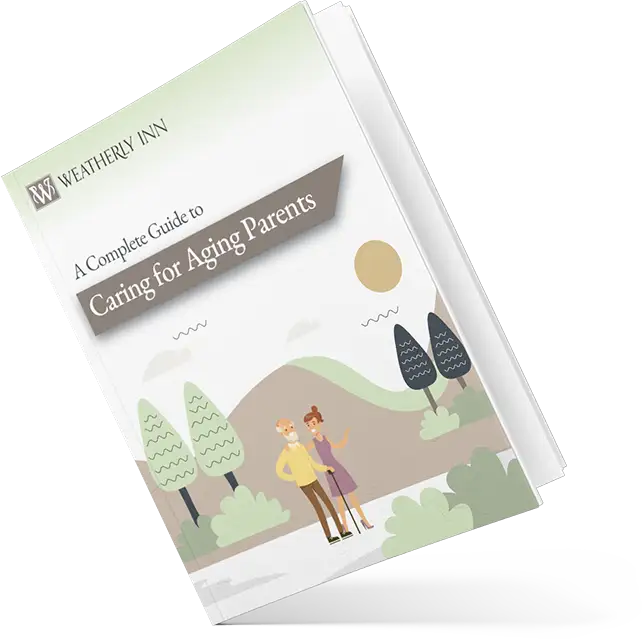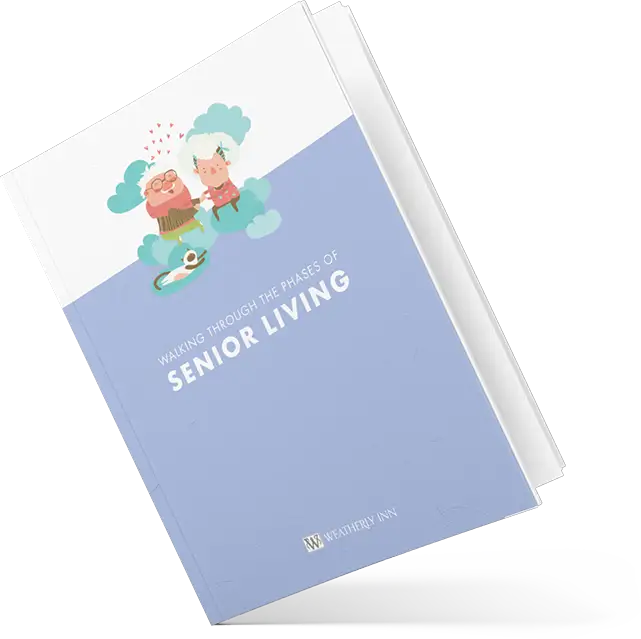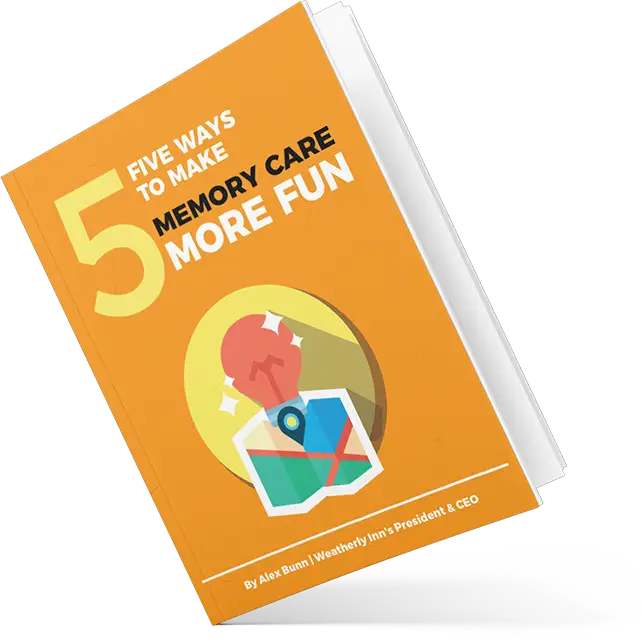July 11, 2019
Caring for an aging family member or loved one can be challenging, especially when memory loss becomes a part of the equation. As time passes, it can become more and more difficult to interact with your loved one, and greater assistance may be required. As challenging as these transitions can be, older adults facing Alzheimer’s disease or undergoing dementia care can still experience joy, meaning and fun with the help of their family and friends through stimulating games and activities. In this post, we’ll share the best group activities and memory games for people with dementia in order to help you better care for the people in your life dealing with memory loss.
Understanding Dementia and Memory Loss
We define ourselves through our memories, and they shape how we perceive the world. Here are some helpful/common terms to understanding when learning about dementia and memory loss:
Short-Term Memory. Short-term memory, is what we use to remember small things like what we had for breakfast or watched on television last night. All memories start out in this category and dissipate relatively quickly. Losing short term memory is often the first noticeable sign for people with Alzheimer’s and other related forms of dementia.
Long-Term Memory. Anything that the brain determines to be vital is “moved” from short-term to long-term memory. These memories are less affected by memory loss. The value our minds place on memory can often be out of sync with reality, which is why certain nonessential events like childhood experiences tend to crop up and while other items like where the car was parked seem to be forgotten.
How Are Memories Formed? Memories are stored through the brain as groups of neurons send signals in particular patterns associated with an original event as it happens. The initial connections are very weak and decay in short order unless they are reinforced through increased usage. This process functions throughout life with minimal changes as we age. The region in which it happens, however, naturally shrinks starting when people reach their mid-20s. However, a healthy diet, plenty of exercise, and mental stimulation have all been shown to help delay this progression. By addressing the three pillars of cognition: memory retention, social interaction, and new experiences, we can make a positive impact for someone living with dementia, actually delaying memory loss and creating a special bond during this season of life.
3 Activities And Games For People With Dementia
In this section, we’ll cover 3 games and activity ideas that can benefit both Dementia patients and Alzheimer’s patients. These stimulating activities can be done in the comfort of your home, or at a care facility/nursing home and can aid memory care efforts.
Show and Tell
Since the 1960s, reminiscence therapy has been used to provide a drug-free treatment option with no risky side effects. Reinforcing memory helps your loved one stay connected and enjoy a higher quality of life. Research shows that when we revisit older memories, we strengthen them. Walking down memory lane not only helps improve cognition, it provides a way for you to stay connected to your loved one. Ask questions and allow your loved one to respond, following the conversation wherever it leads. You can cover stories, mishaps, vacations, and special moments. It is often the oldest memories that we remember best, so pay close attention to childhood games, homes, and pets. Most people collect all kinds of mementos from earlier years: photos, awards, pins, newspaper clippings, letters…the list goes on.
As you uncover links to your loved one’s past, create a collection of physical objects that can be used to keep memories alive. Going through keepsakes with your loved one reinforces those important memories. Why not bring out your mother’s favorite broach on Mother’s Day or give your dad a keychain from his favorite car! Relatives, friends, and neighbors can be great sources for these keepsakes. Just having friends and family reminisce together can be lots of fun. And take the kids for a sure way to bring back memories and a smile to your loved one’s face.
Make Music
Practicing music improves memory and concentration for individuals of all ages and neurological capabilities. It’s a great activity for engaging a person’s hand-eye coordination. In a recent study published by Hearing Journal, it was shown that three months of weekly piano lessons and practice helped improved overall processing speed and memory for adults between the ages of 60 to 85. Music is a powerful tool for those with memory loss. Familiar melodies impact the mind in ways that go well beyond regular conversation. The right song can shift mood, reduce stress, improve cognitive function, and stimulate rewarding social interactions. Music requires little in the way of cognitive processing, especially for songs known “by heart.”
Since this is different than most memory functions, it is usually left intact well into the final stages of the condition. Music is probably the quickest and easiest way to bring joy to an elder with memory loss. Here are some ways you can integrate music into your loved one’s life:
- Download a playlist of a top ten music list from young adulthood (concentrate on ages 18-25)
- Attend local music performances
- Get up and dance while you listen
- Sing-along together with tunes/hymns from childhood
- Encourage regular playing of lifelong musical instruments such as a piano
Music often helps caregivers with activities of daily living, such as getting dressed and grooming—turning challenging tasks into enjoyable interactions. Sing or hum along together with a familiar tune or turn on background music. Remember that the goal is to help connect the past to the present; this often occurs with strong emotion so be prepared for unexpected results.
Go Out and About
Remember when going for a drive was a favorite pastime? Our parents were eager to put a new car through its paces on the country’s new highway system, into national parks, or just around their local community. Driving was recreation, freedom, and a source of pride. Bring back that nostalgia by going out for a drive; familiar sights and sounds bring back fond memories and provide a magical setting where conversations flow. If you can swing by a favorite spot or drive-through for old times’ sake, that can make the excursion all the more special. Senior living communities or care homes understand the importance of taking regular scenic drives. Residents look forward to these outings and return content and ready for a nap or dinner. Make use of sunny days to go out and experience nice weather. Enjoy physical activities, take a walk, smell the roses, and get some fresh air. Sometimes it’s good just to sit awhile, rest, and enjoy each other’s company. Go where there’s a view of the water or stop by a local playground to watch children at play. More ideas for visiting include the local airport to see the planes, a construction site at a safe distance, and public gardens.
Tip: Go with it. Remember that preferences are important in guiding you in what works. Don’t force an activity that is frustrating or isn’t appreciated by someone with memory loss. If it isn’t fun, it’s probably not working, so move on to the next idea.
4 Daily Activities To Help With Memory Loss
If you’re looking for fun games or daily activities help curb the impact of memory loss, we’ve compiled a list here:
- Simple Card Games
- Baking
- Checkers
- Gardening
You may need to buy a pack of playing cards, but games and activities like these can go a long way in helping your loved one cope with memory loss.
Remember To Be Flexible With Your Loved One
This post touches on three ways to have more fun while strengthening the pillars of cognition – memory reinforcement, social interaction, and new experiences. With these simple strategies, you can help rediscover the past and forge new memories that you both will cherish. Having fun is not only possible with cognitive challenges, but many find it essential to having a good day. Just remember to be flexible and willing to change direction, whether that’s during a planned activity or simply a conversation that takes its own course. At Weatherly Inn, we rely on humor and fun to facilitate quality of life for our residents, and our team uses all of these concepts to develop our program.
If you’d like to see first-hand how we care for residents with dementia or memory loss, you can schedule a visit today!
Sources:
1.https://www.medicalnewstoday.com/articles/memory-loss
2. https://www.mayoclinic.org/healthy-lifestyle/healthy-aging/in-depth/memory-loss/art-20046518
3. http://www.apa.org/research/action/memory-changes.aspx
4. http://www.aafp.org/afp/2017/0615/p771.html
6.http://www.mayoclinic.org/healthy-lifestyle/caregivers/in-depth/alzheimers/art20046331?pg=2
7.https://www.nammfoundation.org/articles/2014-06-01/why-play-music-seniors
8.http://www.livescience.com/35572-memory-tricks-improve-learning-early-alzheimers.html



